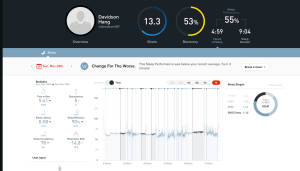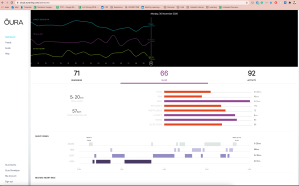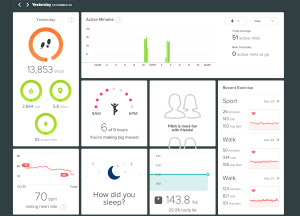I wanted to share the pros and cons of each of these fitness trackers with you and have I have leveraged these tools to stay fit and healthy through consistency accountability.
I want to acknowledge that before COVID I was attending regular yoga, Meditation, Crossfit, and HIIT workouts. I miss those so much, but I have leverage YouTube to do free exercises to stay in shape since then.
Pros and Cons of Whoop
- You barely notice the strap, and it gives you the most data from Heart Rate Variability to Sleep Quality.
- Whoop has a community. For instance, my friend Ian invited me to the Cayman Islands whoop group, and if I am feeling competitive, I can push myself.
- They give you a strain score and lets you know how much you are pushing yourself every day. Depending on your goals, this can help you maintain an optimal level of fitness. For instance, yesterday I pushed myself, and it showed that I pushed myself more than I usually do. My heart rate was high, and I maintained the right level of optimal heart rate percentage.
Cons:
- It’s the most expensive option out of the three options, and I would only recommend it if you are serious about your fitness, and you are trying to take it to the next level. It’s worth the investment if you want to see how far you can push yourself. For instance, Jeff, Paul, Hayden, and I will do regular As Many Reps as Possible sets in 12 minutes where we complete five sit-ups, ten push-ups, and 15 squats. I was able to go from 21 sets to 31 sets completed in 12 mins over the course of the last few months. Whoop was able to show that I can put more strain on my body but breaking down my muscles even more. This helped me push my limits.
- Sometimes when I get a reading that I need more sleep- I already know that sometimes ignorance is bliss but can you improve something you do not measure, which is why I still want to get better. If it’s a blind spot, then I should deal with it.

Pros and Cons of Oura Ring
Oura Ring is a ring that you put on yourself and it measures
- Sleep Score
- Lowest Resting Heart Rate
- Average Resting Heart Rate
- Total Sleep
- Restfulness
- REM Sleep
- Sleep Latency
- Sleep Timing
- Bedtime
- Deep Time
- Wake Up Time
- REM Sleep
- Light Sleep
- Awake Time
- Respiratory Rate
All of this data is meant to help you to be able to prioritize sleep. It’s an interesting time to experiment with all of this has COVID has enabled us to have more free time. I’ve been sleeping more than I usually have before the pandemic, so that’s one thing I am grateful for. I have noticed myself functioning more optimally and being efficient.
Pros:
- The ring looks cool. I got the gunmetal black one, which I enjoy- It’s barely noticeable. You get used to it, so it’s not a big as the Fitbit, which I notice more, so I don’t wear the Fitbit Alta to Sleep.
- The data is clean and the ring charges quickly, and it has a very long battery life. Out of all of the three fitness trackers, Oura seems like it requires the least maintenance, but it doesn’t have as many data points as Whoop.
Cons:
- You technically don’t need any of this data. Sometimes I’m not even sure what to do with the data. They give me a pretty accurate readiness score. It seems to know the quality of my sleep, which will impact the quality of my day. Knowing that helps me able to want to sleep.

Pros and Cons of Fitbit Alta HR
Pros
- I order the Fitbit because of the large community- because it integrates with Facebook. I was able to add so many of my friends who being able to attempt to be the #1 steps person every day has helped me live a pretty healthy life. Since I have moved to the suburbs it’s been harder to get as many steps in and because there is a pandemic I’m a bit more cautious when I go to the park and things like that.
- It lasts pretty long- I’ve had it for over three and a half years, and it works perfectly fine. It’s never had any huge issues or anything like that. The battery life will last me at least three days, and I’m pretty active too.
- You don’t need to log anything. It will automatically track it for you, so it requires low maintenance in terms of being able to track data. For whoop, for instance, you have to track all of your activities, requiring more work on the front end.
Cons:
- Sleeping with it is uncomfortable, so I don’t use the sleep function as much.
- Fewer people it seems like have Fitbit compared to when it first came out. I think people are using Apple watch more, so there are fewer people to compete with, but you can join other communities but for me, I would rather compete against my friends.
Fitbit also has a Premium functionality that was fun for putting together games where it’s helped me want to get more steps in when I was competing against Joel Peterson.
I hope you enjoyed my reviews. Let me know what you think and want to go into further detail with any of these fitness trackers.
I’m sharing with you how I leverage these tools to stay healthy, and love to hear how you have leveraged them.
If you found this to be helpful, leave a comment and I will post my reviews and takeaways from other products.

Hope you enjoyed my reviews. Let me know what you think and if you want to go in further detail with any of these fitness trackers.
I’m sharing with you how I leverage these tools to stay healthy and would love to hear how you have leveraged them as well.